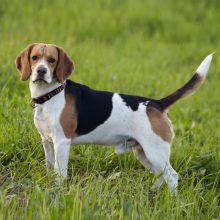Beagle
Lifestyle Needs

The Beagle is a member of the Hound group of dogs, originally bred for hunting in packs. He still has a strong hunting instinct. He’s a medium sized dog who is a popular family pet. He needs plenty of exercise both on and off lead. He has a short, dense coat which is relatively easy to keep clean. He needs to be groomed regularly.
Genetic Diversity
(Known as Coefficient of Inbreeding: 'COI'. It should be as low as possible.)
The UK Kennel Club breed average COI is 10.2% - See 'A Beginners Guide to COI'
Gene Pool Size
(Known as Effective Population Size: 'EPS')
54.9
EPS is a measure of how many individuals are contributing genetically to a breed population. It is a measure of the size of the gene pool in a breed. Lower than 100 is considered critical by conservationists and below 50 brings a breed close to extinction. For more information see the Kennel Club article.
Health and Welfare Problems due to Conformation
(Body shape and physical characteristics)
- The Beagle’s long ears will have some impact on his ability to signal effectively to other dogs.
- His moist and damp lip folds may cause skin inflammation or infection.
- Excessive wrinkling could lead to entropion
- Prone to obesity
BVA/KC Health Schemes: www.bva.co.uk/chs
- Hip dysplasia: breed 5 year mean score 18.9 (parents should be lower)
- Eye disease: Multifocal Retinal Dysplasia (MRD) (litter screening); Primary open angle glaucoma (annual screening) (or DNA test – see below)
Estimated Breeding Values (EBVs) : No EBVs are currently available for this breed
www.thekennelclub.org.uk/about-ebvs
DNA Tests Available
DogWellNet and IPFD Harmonisation of Genetic Testing for Dogs (HGTD)
www.dogwellnet.com/breeds
- Lafora disease
- MLS Musladin-Lueke syndrome
- NCCD Neonatal cerebellar cortical degeneration
- Factor VII deficiency
- IGS Imerslund Grasbeck Syndrome / cobalamin malabsorption
Availability of a DNA test does not mean that it is always necessary or even desirable for breeders to use this test.
Other Breed-Specific Health Screening Schemes
None known
Ask the breeder to show you the certificates for the above tests/screening for both parents. If any of the above tests have not been considered necessary by the breeder (and there may be good reasons), ask her to explain why.
Other Diseases Reported
(For which there are currently no genetic or screening tests for sire or dam)
- Hypothyroidism
Ask the breeder about the medical history of the parents, grandparents and great grandparents. Consider carefully whether to purchase a puppy if some of these or other diseases are in the family line.
Ask about the breeder’s policy in cases of serious genetic diseases occurring to your puppy in later life. Good breeders will request to be informed of such events in order to improve future breeding decisions.
You are strongly advised to buy from a breeder who uses (or is prepared to use) the AWF Puppy Contract and Puppy Information Pack (PIP): www.puppycontract.org.uk
The breeder should also be familiar with the CFSG/DBRG Code of Practice for Dog Breeding